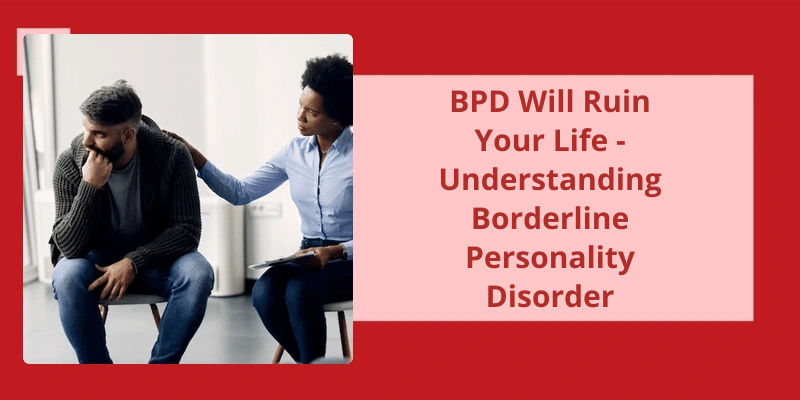Borderline Personality Disorder (BPD) is a challenging and often misunderstood mental health condition that can significantly impact a person's life. It’s characterized by intense emotions, difficulty with relationships, and impulsive behaviors, which can be detrimental to one's social and professional life. People with BPD often struggle with self-image, fear of abandonment, and self-destructive behavior, leading to a sense of hopelessness and despair. Unfortunately, many individuals with BPD find it challenging to get an accurate diagnosis, and even when they do, they may face challenges accessing the appropriate treatment they need to manage their symptoms. BPD symptoms may worsen over time, leading to a host of problems that could result in ruined relationships, loss of employment, and a decline in overall quality of life. If left unaddressed, BPD can cause long-term emotional and physical harm, further underscoring the importance of proper diagnosis and effective treatment for individuals struggling with this condition.
Is BPD the Hardest Mental Illness to Live With?
Borderline personality disorder, commonly known as BPD, is a highly stigmatized and often misunderstood mental illness. It affects around 1-2% of the population, and it’s characterized by intense and unstable emotions, impulsive behavior, unstable relationships, and a distorted self-image. People with BPD often struggle with a sense of emptiness and fear of abandonment, which can lead to patterns of idealization and devaluation in their relationships.
Living with the symptoms of BPD can be incredibly challenging. People with BPD often struggle to regulate their emotions and can experience intense mood swings, which can make daily life feel like an emotional rollercoaster. They may also engage in impulsive behaviors such as substance abuse, risky sexual behavior, or self-harm, putting themselves in danger. These behaviors can lead to difficulties in work, school, and personal relationships, making it challenging to maintain stability in their lives.
This constant fear can lead to intense mood swings, self-harm, and suicidal thoughts and behaviors, making it a highly dangerous mental illness to live with.
Treatment for BPD can be challenging, as people with BPD often require more intensive and long-term therapy than other mental illnesses. Therapy such as Dialectical Behavioral Therapy (DBT) can be effective in helping individuals with BPD regulate their emotions, manage their impulsivity, and learn new coping skills. However, it can take time to see improvement with BPD, and the intensive therapy required can be a significant barrier for many individuals.
It requires significant commitment to therapy and self-care, as well as a healthy support system and understanding from loved ones. It’s essential to reduce the stigma surrounding BPD and other mental illnesses to help individuals access the support and treatment they need to live fulfilling lives.
The Impact of Childhood Trauma on BPD: A Closer Look at How Childhood Trauma Can Contribute to the Development of BPD and the Unique Challenges Individuals With BPD Face as a Result.
- Childhood trauma can contribute to the development of BPD
- Individuals with BPD face unique challenges as a result
- Psychological support and therapy can help individuals with BPD manage their symptoms
- Early intervention and treatment can improve outcomes for those with BPD
- Increased awareness and understanding of the impact of childhood trauma on mental health is important in addressing BPD
It can be discouraging to receive a diagnosis of Borderline Personality Disorder (BPD), but it’s important to know that the condition is manageable with proper treatment and support. While individuals with BPD may exhibit risky behavior, many are able to lead successful, fulfilling lives. With the right tools and resources, it’s possible to overcome the challenges associated with BPD and live a happy, healthy life.
Will I Ever Have a Normal Life With BPD?
With the right treatment, you can learn how to manage your symptoms and live a fulfilling life. It’s important to work with a mental health professional, such as a therapist or psychiatrist, who specializes in the treatment of BPD. Therapy can be particularly beneficial for those with BPD, as it helps individuals to understand and regulate their emotions, develop healthy coping mechanisms, and improve their relationships.
Another important aspect of managing BPD is self-care. Self-care practices, such as exercise, healthy eating, and getting enough sleep, can have a significant impact on your overall well-being and mental health. In addition to these practices, practicing mindfulness techniques, such as meditation or deep breathing, can be helpful in reducing stress and anxiety.
Building a support network is also crucial in managing BPD. This may include friends, family members, or support groups. It’s important to surround yourself with individuals who’re understanding and non-judgmental, and who can provide you with emotional support when you need it. Joining a support group can also be beneficial, as it allows you to connect with others who’re going through similar experiences and share advice and coping strategies.
It’s important to remember that recovery is a process, and it’s okay to have setbacks. It’s not uncommon for people with BPD to experience relapses or challenging periods.
While living with BPD may present challenges, it’s important to know that you can achieve a normal life. It’s important to seek help and surround yourself with supportive people who can help you on your journey to recovery. Remember, recovery is possible, and you aren’t alone in your struggles.
While living with Borderline Personality Disorder (BPD) may feel overwhelming and never-ending, there’s hope for recovery. With the right combination of therapy, introspection, and supportive relationships, individuals with BPD can learn to manage their symptoms and find emotional stability. Unlike depression or anxiety disorders, BPD doesn’t have to be a lifelong companion. In the following sections, we will explore the possibilities of BPD recovery and offer some tips for those on this journey.
Will I Ever Feel Normal With BPD?
Many individuals who struggle with Borderline Personality Disorder (BPD) wonder whether they’ll ever feel “normal”. They may feel as though their emotions, thoughts, and actions are unpredictable and uncontrollable, causing significant distress in their lives and relationships. While it may seem daunting, recovery from BPD is possible with consistent therapy, self-awareness and support.
A therapist can help individuals with BPD identify and understand their emotional triggers and work on developing healthy coping mechanisms. One of the most commonly used therapies for BPD is Dialectical Behavioural Therapy (DBT), which focuses on developing mindfulness, emotion regulation, interpersonal effectiveness, and distress tolerance skills. Other types of therapy, such as Cognitive Behavioural Therapy (CBT) and psychodynamic therapy, may also be helpful depending on an individual’s specific needs.
Individuals with BPD may struggle with self-identity, self-worth, and identity confusion. Engaging in activities that promote self-discovery and self-reflection can be helpful in gaining a better understanding of oneself and developing a stronger sense of self. Journaling, meditation, and art therapy are examples of activities that can facilitate self-awareness.
Having a supportive network can also aid in BPD recovery. Friends, family, and loved ones can provide emotional support, encouragement, and understanding. Joining support groups can also be helpful in connecting with others who’ve similar experiences and receiving validation, insight and feedback.
It’s important to remember that BPD recovery is a process and can take time. Progress may not always be linear, and setbacks may occur. However, with persistence and determination, recovery is achievable. Seeking professional help, engaging in self-awareness activities, and building a supportive network are all steps individuals can take towards feeling “normal” and living a fulfilling life with BPD.
While it may take time and effort, engaging in therapy, self-reflection, and building a supportive network can lead to significant improvement in quality of life and overall well-being. It’s never too late to take the steps towards a happier and healthier life.
How to Support a Loved One With BPD
Borderline Personality Disorder (BPD) can be challenging to manage, but supporting a loved one can make a positive difference. Encouraging professional help, practicing empathy, and creating healthy boundaries are a few ways to provide support. Educate yourself about the disorder to understand your loved one’s experience better. It’s essential to communicate openly and avoid blaming or criticizing them. Remember, their emotions may change frequently, so patience and consistency are the keys to providing support.
While self-destructive behaviors are a common trait among those with Borderline Personality Disorder (BPD), it’s important to understand that not all individuals with BPD always display or act on these behaviors. It’s a complex mental health condition that can manifest differently in each person, and not everyone with BPD will have an inherent drive to self-destruct.
Are People With BPD Always Self-Destructive?
However, it’s important to note that not all people with BPD display self-destructive behavior. Each person with BPD is unique and may have different coping mechanisms or reactions to emotional distress.
It’s also important to recognize that self-destructive behavior is often a result of underlying emotional pain and trauma. Addressing the root causes of this pain is crucial in reducing the frequency and severity of self-destructive behavior. This may involve a combination of therapy, medication, and self-care practices such as meditation or exercise.
Treatment for BPD must take into account the unique needs and experiences of each patient.
The Impact of Childhood Trauma on the Development of BPD
Childhood trauma, such as abuse or neglect, can have a significant impact on the development of borderline personality disorder (BPD) later in life. Studies show that individuals who experience childhood trauma are more likely to develop BPD symptoms, such as emotional instability and impulsivity. It’s important for individuals who’ve experienced childhood trauma to seek appropriate support and treatment in order to manage their symptoms and improve their quality of life.
This tendency to hold grudges is a common characteristic of Borderline Personality Disorder (BPD). People with BPD often struggle with regulating their emotions and have intense reactions to interpersonal situations, which can lead to holding onto negative feelings for longer than others might. In this article, we’ll explore the reasons behind this behavior and how it can impact relationships.
Why Do People With BPD Hold Grudges?
The reason why people with BPD hold grudges is quite complex and multi-faceted. For starters, individuals with BPD have a heightened sensitivity to rejection and abandonment. They feel intensely and can react strongly to perceived slights or hostility from others, which can quickly escalate into feelings of anger and resentment.
Furthermore, many people with BPD have experienced trauma or invalidation in their past. They may feel like theyve been wronged by others before and are therefore prone to holding onto grudges as a way to protect themselves from future harm. In some cases, this may even be a form of self-preservation.
It’s also worth noting that people with BPD tend to view things in black and white terms. They may see the world as either entirely good or entirely bad, with little room for gray areas. This means that when someone does something to upset them, it can be difficult to see that person in a positive light again.
Conclusion
From impulsive behavior to tumultuous relationships, BPD can lead to a multitude of challenges that can limit an individual's ability to function in their daily lives. It’s important to approach BPD with empathy and understanding, recognizing that individuals with BPD often require specialized treatment and support to manage their symptoms effectively. With appropriate interventions, however, individuals with BPD can lead fulfilling lives and engage in healthy relationships. Nonetheless, it’s crucial to take BPD seriously and support those who may be struggling with this condition.






